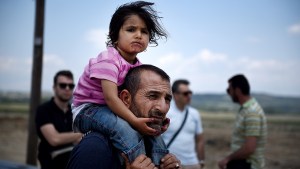Lenten Campaign 2025
This content is free of charge, as are all our articles.
Support us with a donation that is tax-deductible and enable us to continue to reach millions of readers.
Receiving members of a Spanish charitable organization on November 4, 2024, Pope Francis lamented the low demographics in Europe while inviting Christians to welcome poor and migrant people. He explained that this is a way of “welcoming Christ.”
The role of migrants in an aging society
“Let’s be grateful that migrants are coming, because the age level of the local population [in Spain and Italy, ed. note] is a bit scandalous,” said Pope Francis in an address to participants at the third “Churches, Field Hospitals” meeting, an initiative promoted by the Spanish association Messengers of Peace.
“I think the average age in Italy is 46. They have no children. Oh yes, they all have a dog or a cat, but they don’t have children. And the migrants arrive, and well, in a way, they’re the children we don’t want to have,” continued the Argentine pontiff in his speech, delivered in Spanish.
But beyond the demographic, for Francis, taking care of the most vulnerable “is always a privilege” because it’s “taking care of the Lord himself.”
Christians need to understand that evangelization is not “an abstract thing” or an “ideology which is reduced to indoctrination.”
“Every time we have the opportunity to approach them, to offer them our help, it’s an opportunity to touch the flesh of Christ,” he insisted. He encouraged his listeners to “keep seeing in each of them vulnerable people, and in that vulnerability, the face of Christ.”
Welcoming with gestures more than with words
Throughout his address, he emphasized the importance of “bearing witness to welcoming people, with gestures more than with words.”
Since the beginning of his pontificate and his visit to the island of Lampedusa in July 2013 to denounce the tragedy of migrant deaths in the Mediterranean, Pope Francis has repeatedly pronounced messages aimed at welcoming them and integrating them in host countries.
At the same time, he regularly expresses concern about the declining birth rate in Europe. As recently as last May on the occasion of a symposium in Rome on the birth rate, he described that region of the world as a “continent of old people.”
In Italy, the aging of the population is accelerating: The average age was 46.4 in 2022, up from 46.2 in 2021. The country has one of the lowest fertility rates in Europe — 1.24 children per woman — and the number of residents is in constant decline, according to official statistics. In 2022, Italy’s population numbered 59 million. It’s expected to fall to 58.1 million in 2030, 54.4 million in 2050 and 45.8 million in 2080.
Hope in the face of inequality
Pope Francis points out that the elderly and the young are among the vulnerable who suffer from inequality.
The elderly are “thrown away,” sent to retirement homes “as if they had nothing to contribute to society.” The young, those who are poor in particular, are exploited for cheap labor.
Lastly, the Pope said it was necessary to spread hope. “In each person you welcome, in each person who is vulnerable, sow hope.”
“Remind them that Christian hope is greater than any situation (…) because hope has its foundation in the Lord, not in mankind.”



